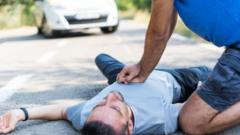Will Your Driving Theory Test Soon Include CPR and First Aid Questions?

Life-Saving Skills: The Role of CPR and Defibrillators in the Driving Theory Test
In a groundbreaking move, the UK's Driver and Vehicle Standards Agency (DVSA) has decided to integrate crucial life-saving skills into the driving theory test. Starting in early 2026, all learner drivers will be required to familiarize themselves with cardiopulmonary resuscitation (CPR) techniques and the use of defibrillators. This initiative aims to prepare drivers for emergency situations, particularly those involving cardiac arrests, which can occur unexpectedly on the roads. With an estimated 2.4 million learners taking the theory test each year, this change has the potential to save countless lives.
The Importance of CPR and Defibrillation Knowledge
Cardiac arrest is a critical medical emergency, and drivers are often the first responders at the scene. Research indicates that immediate CPR and the use of a defibrillator can dramatically increase survival rates. In fact, when both are administered within the first few minutes of a person's collapse, the chances of survival can soar to as high as 70%. Conversely, without such interventions, fewer than one in ten victims survive. Understanding how to act quickly in these situations can make all the difference.
What Will Be Included in the Driving Theory Test?
The DVSA is set to incorporate specific questions related to CPR and defibrillator use into the theory test. Updated learning materials will feature questions designed to enhance learners' knowledge and preparedness. For example, one of the questions might ask, "Who can use a public access defibrillator?" The answer, simply stated, is "everyone." This highlights the accessibility and user-friendly nature of these life-saving devices, which come equipped with straightforward instructions to guide users through the process.
Understanding Defibrillators
Defibrillators are essential tools in emergency situations, providing a controlled electric shock to the heart to restore its normal rhythm. When a person experiences a cardiac arrest, every second counts. Defibrillators are designed to be intuitive; they often have audio and visual prompts, making them accessible even for those with no prior medical training. Their widespread availability in public places further enhances the likelihood that someone will be able to assist in an emergency.
How to Perform CPR
In the event of a cardiac arrest, the first step is to call emergency services (999 in the UK) and then initiate CPR immediately. The NHS recommends that chest compressions be performed using the "hands-only" method, which focuses on delivering timely compressions to maintain blood circulation. Here’s a quick guide on how to perform effective chest compressions:
- Place the heel of one hand on the center of the person’s chest.
- Place the heel of your other hand on top of the first hand and interlock your fingers.
- Keep your elbows straight and position your shoulders directly above your hands.
- Compress the chest at least 5 to 6 cm deep at a rate of 100 to 120 compressions per minute.
- Allow the chest to fully recoil between compressions.
Continuing with CPR until professional help arrives can significantly improve the victim's chances of survival.
Training and Awareness
The introduction of CPR and defibrillator awareness into the driving theory test is a collaborative effort involving various organizations, including the Resuscitation Council UK. Their chief executive, James Cant, expressed enthusiasm about this initiative, emphasizing the importance of equipping individuals with the knowledge and confidence to act during a cardiac arrest. By embedding these skills into a widely taken assessment, the DVSA aims to foster a culture of preparedness among drivers, benefiting communities across the UK.
The Benefits of Learning CPR and Defibrillator Use
Integrating CPR education into the driving theory test is expected to yield numerous benefits:
- Increased Awareness: More individuals will be informed about the importance of CPR and the use of defibrillators.
- Life-Saving Skills: Drivers will gain essential skills that can be applied in emergencies.
- Community Empowerment: With more people trained, communities become safer and more resilient.
- Reduced Mortality Rates: Enhanced immediate response can lead to lower fatalities from cardiac arrests.
These benefits underscore the necessity of equipping learners with the tools they need to respond effectively in emergencies.
Conclusion
The integration of CPR and defibrillator awareness into the driving theory test marks a significant step toward improving emergency response on the roads. By educating millions of drivers annually, the DVSA is not only enhancing their skill set but also potentially saving lives. This initiative highlights the vital role that every individual can play in cardiac emergencies and reinforces the importance of being prepared. As we look forward to this change in 2026, it's crucial to ask ourselves: are we ready to take action in a life-threatening situation?
Frequently Asked Questions
Why is CPR important for drivers?
CPR is crucial because drivers are often the first on the scene of an emergency. Knowing how to perform CPR can significantly increase the chances of survival for someone experiencing a cardiac arrest.
What is a defibrillator, and how does it work?
A defibrillator is a device that delivers an electric shock to the heart to restore its normal rhythm. It is simple to use, often featuring voice prompts to guide users through the process.
How can I learn CPR and use a defibrillator?
You can learn CPR and defibrillator use through various organizations offering training courses, including local hospitals, community centers, and the Red Cross. Many programs also provide certification.
What should I do if I encounter someone in cardiac arrest?
If you find someone unconscious and not breathing normally, call emergency services immediately and start CPR right away. Use chest compressions until help arrives.
With the upcoming changes to the driving theory test, it's essential for all drivers to be prepared. Are you ready to learn these life-saving skills? #CPR #Defibrillator #EmergencyResponse
Published: 2025-08-13 00:42:22 | Category: technology



